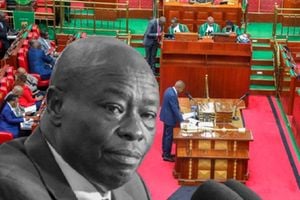
Deputy President Rigathi Gachagua addresses the media at his official residence in Karen, Nairobi on October 7, 2024.
If there is one invaluable lesson from the impending exit of Deputy President Rigathi Gachagua, it is in the precedents set in the grounds for impeachment passed by the National Assembly last week, and set for confirmation by the Senate over the next two days.
The DP was accused of a host of misdeeds, including corruption, unexplained wealth, tribalism, insubordination, incitement to violence, bullying, abusive language, conflict of interest, undermining government, and a host of other misdeeds.
Scrutiny of the grounds listed shows that if one simply removed Gachagua’s name on the impeachment motion and replaced it with that of President William Ruto, or any other senior government personality, the charges would still stick.
We thus owe Dr Ruto and other architects of the impeachment motion, including National Assembly Majority Leader Kimani Ichung’wah and Kibwezi West MP Mwengi Mutuse, who was given the document to table, a debt of gratitude. We must also not forget the contribution of National Assembly Speaker Moses Wetang’ula and, in advance, Senate Speaker Amason Kingi.
All those who contributed to designing, drafting and aiding the passage of the impeachment motion played invaluable roles in furthering the rule of law. They have helped design the template we can in future use to remove a president, deputy president or any other leader who commits similar infractions.
Gachagua, for example, was accused of amassing great personal wealth within a short time as DP. Multiplication of assets way beyond one’s known emoluments is now established grounds for removal from office.
The impeachment hearing established that there is no need to actually prove that assets acquired in office are proceeds of corruption. There is even no need for actual criminal proceedings to establish theft or other crimes. Mere suspicion is enough.
The Deputy President was also accused of conflict of interest and abuse of power by profiting from doing business with the government. We have heard of many other leaders with interests in hotels, helicopter leasing, road haulage, office blocks, petroleum imports and other enterprises that depend a lot on government custom. We must now look forward to all of them being hauled before parliamentarians under the new precedents.
Grounds
It is now established that attacking judges is grounds for impeachment, as is defying court orders, or using security agencies to threaten harm to business rivals. Even lying or using abusive language can have one shown the door.
An interesting ground brought up in Parliament was Mr Gachagua’s alleged dismissal as a District Officer on accusations of diverting relief food. To his credit, Mr Wetang’ula saw no need to subject the letter tabled in Parliament to verification.
This is because constitutional requirements on leadership, integrity and ethics cannot be hamstrung by narrow technicalities and legalisms. In the past, we made the mistake of insisting that disqualification from office for breach of the ethical code can only follow criminal conviction.
That allowed many people facing accusations of corruption, land-grabbing, murder, hate crimes and even crimes against humanity to be cleared for high office on the grounds that they have not been convicted.
Thanks to the Gachagua impeachment, the intent of the framers of the Constitution has been realised in regard to Chapter 6 on Leadership and Ethics as well as the Public Officer Ethics Act of the Laws of Kenya. The principles matter more than the loopholes previously exploited by miscreants.
***
Somebody, please explain this to me in simple terms, as if I were a certain Nairobi senator:
Eons ago, we abandoned butter and turned to margarine. The latter, based on vegetable oils, was supposed to be a healthier alternative, let alone friendlier to the pocket. Now we are being told to go back to butter as the margarines in the market, some of which have since dropped the name and now simply call themselves ‘spreads’, are just a few digits away from the chemical composition of plastics.
We also moved away from cooking fat manufactured from animal fat, and adopted oils derived from vegetables, seeds, nuts and grains, which were touted as cholesterol-free and better for the heart. Now there is a huge stampede back to animal fats, including ghee, tallow and lard.
Finally, we have many of the fairer gender who spend fortunes on designer cosmetics and lotions. Today, alongside the pricey skin-care products in their purses, will be the obligatory jar of a cheap milking jelly originally designed for cows, but now preferred to the established brands of petroleum jelly sold for human use.
[email protected], @MachariaGaitho








